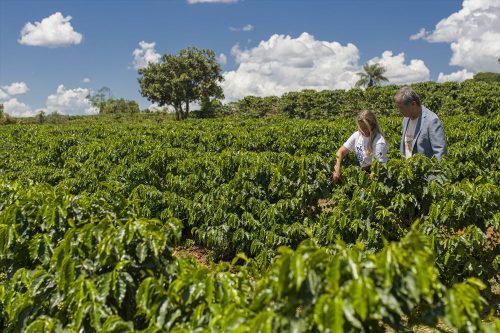Responsible coffee bean sourcing
The KOMEDA Holdings Group considers the environment and the welfare of communities in its procurement activities, reflecting its desire to source raw materials sustainably.
As part of these efforts, KOMEDA Co., Ltd. practices responsible coffee bean sourcing by selecting suppliers that respect human rights and the environment. The latter is especially important because coffee bean production has been seriously impacted by global warming and climate change in recent years.
Rising average temperatures, droughts, floods, and other abnormal weather patterns have resulted in fluctuating harvest yields and forced growers to move to other regions. At the same time, suppliers must respect the rights of workers while giving due consideration to challenges faced by communities in their regions.
To address these issues, KOMEDA uses coffee beans grown only by farmers who meet the sustainable procurement standards set by Olam Group Limited,1 a Singapore-based coffee bean supplier. Furthermore, 75% of the coffee beans used by KOMEDA have attained AtSource2 certification.
In February 2025, KOMEDA Holdings President Yuichi Amari visited a plantation in Brazil that supplies his company with coffee beans. He confirmed that human rights were not being violated by, for example, the use of child labor or forced labor, and that the plantation was being managed with due consideration to the environment.
He also met with the President of Olam Agricola Ltda.’s Brazil Coffee Division to discuss issues facing coffee bean plantations. As a result of these discussions, President Amari realized that coffee bean producers need continuous support because, in addition to climate change, which has led to crop failures and variations in coffee bean quality, the biggest issue today is a decline in the number of growers.

President Amari inspects the plantation in Brazil.
Continuous support for coffee bean producers
In February 2025, KOMEDA launched a project to assist female farmers in Brazil. The project was initiated to provide continuous support for women’s empowerment, which customers chose as the top target for KOMEDA’s support in its KUTSUROGI3 Sustainability Survey4 conducted in 2022.
KOMEDA is offering a one-year training program to provide women with opportunities to study sustainable agriculture, including plantation management, coffee bean quality control, the proper use of agricultural chemicals, and soil management. This year, 15 new people have participated in the Café Delas program, which was created by Olam Group to support female farmers.

Participants at a ceremony held in support of the project.
Dalila Vasconcelos, who participated in KOMEDA’s project supporting women’s empowerment in 2022, explained that she was able to build a relationship with Olam Group through the project, and could sell her coffee beans at a fair price. Coffee beans she had grown received awards at a cupping competition held in a growing area in 2024. This is a testament to how the knowledge and skills she acquired through the project helped her improve bean quality. Everyone at KOMEDA hopes that more women will thrive and find similar success through the support project it conducted this year to assist female farmers in Brazil.

A coffee bean plantation
Sophia Premium Coffee
Released in 2020, Sophia Premium Coffee is made exclusively from beans supplied through Café Delas, a program that helps female producers who run coffee plantations in Brazil. Wanting to improve the livelihoods of coffee bean producers, KOMEDA called the product by a commonly used woman’s name—Sophia—that originally meant “wisdom.”
Sophia is a single-origin coffee product that embodies KOMEDA’s efforts to support female growers while considering their communities and the environment.

A package of Sophia Premium Coffee
Notes:
- Established in 1989, Olam Group Limited is a leading global food and agricultural produce company. Based on its founding vision, “Re-imagining global agriculture and food systems,” Olam Group supplies raw materials and products to more than 20,000 corporate customers, and has established a supply chain spanning from agricultural production—by a network of over five million farmers—to trading, raw material processing, and product manufacturing. Placing sustainability at the heart of its business, Olam Group addresses environmental and societal issues through its relationships with farmers around the world.
-
As a management system for sustainable products and supply chains, AtSource provides clients with data for improving their sustainability-related activities. It offers supply chain traceability information and specifies risk areas that can be addressed to realize practical benefits for people and their communities.
AtSource certification for coffee beans verifies they are sustainable raw materials that meet sustainable procurement standards through third-party inspections conducted every three years. Click here for more information about AtSource. - Kutsurogi is a Japanese word meaning “comfort” and “relaxation.” The KOMEDA Group uses the word to convey the value it offers to customers, specifically the relaxing times and spaces provided at its coffee shops and through its menu items.
- The survey asked customers to choose which of KOMEDA’s three support projects (focusing on women’s empowerment, children’s education, and environmental conservation) that address issues in coffee bean growing regions was most important for them.
